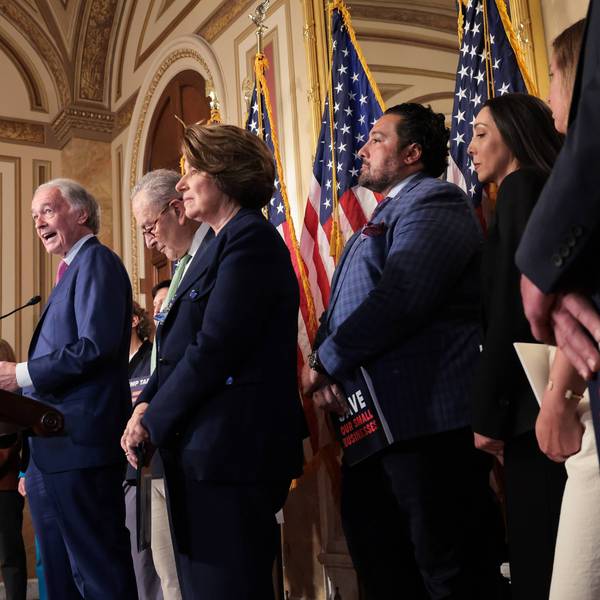U.S. President Donald Trump's enactment of the largest cuts to federal nutrition assistance in the nation's history has severely underresourced charities across the country bracing for a surge in hunger at a time when food insecurity is already at crisis levels.
The Republican budget measure that Trump signed into law last week contains $186 billion in cuts to the Supplemental Nutrition Assistance Program (SNAP) over the next decade and shifts benefit costs onto states, prompting concerns that some states could decide to withdraw from the critical program altogether.
Analysts estimate that under expanded SNAP work requirements that are set to take effect as soon as this year, more than 5 million people—including at least 800,000 children—would be at risk of losing food aid. The Republican law broadens existing SNAP work requirements to include adults between the ages of 55 and 64 and parents whose children are at least 14 years old.
"It's a terrible time," Catherine D'Amato, president and CEO of the Greater Boston Food Bank, told the nonprofit outlet Food Bank News. "These cuts are going to force more food-insecure individuals to turn to already overextended and underfunded hunger relief organizations across the country. We anticipate that there will be a very large impact and a very large cascade."
Feeding America, a nationwide network of food banks, warned after Republicans pushed the unpopular budget measure through Congress that "at a time when food insecurity is rising nationwide, this legislation threatens to worsen the crisis, taking away access to food and healthcare from millions of people, including children, seniors, veterans and people with disabilities."
The organization estimated that the SNAP cuts contained in the Trump-GOP law "could eliminate the equivalent of nearly 6 to 9 billion meals annually," which is roughly equal to the number of meals that the entire Feeding America network distributed last year.
Thomas Mantz, president of Feeding Tampa Bay, told a local media outlet on Tuesday that his organization lacks "the capacity to make up for these cuts."
"For every one meal Feeding Tampa Bay can provide," said Mantz, "SNAP provides nine."
Feeding Texas CEO Celia Cole issued a similar warning.
"We're doing everything we can to fundraise and dig deep," Cole told Politico, "but there's no amount of philanthropy that can make up for the size of the SNAP cuts."
"The damage of this bill will be staggering. Decades of progress in addressing America's hunger crisis will be reversed."
The latest edition of the U.S. Department of Agriculture's Household Food Insecurity report found that more than 47 million people in the U.S. lived in households experiencing food insecurity in 2023, up 13.5 million from 2021.
Advocates say the GOP budget law is set to make the situation far worse.
"The damage of this bill will be staggering," said Crystal FitzSimons, president of the Food Research & Action Center. "Decades of progress in addressing America's hunger crisis will be reversed."
"All of this is happening so that billionaires will receive new tax breaks, a cruel juxtaposition as millions of our nation's children will lose access to basic nutrition," FitzSimons added. "Many will lose access to the free school meals that fuel their health and learning, and to the Summer EBT Program, which helps close the summer child hunger gap."
Around 40 million people across the U.S. currently receive benefits from SNAP, a critical anti-hunger tool that also boosts farmers and local economies. State leaders and advocates have vocally warned that cost-sharing provisions of the Republican law could force them to enact deep cuts to SNAP benefits or other programs to cope with the budget hit.
"These proposed SNAP cuts would be nothing short of devastating for communities across Colorado, especially in rural areas," said Joël McClurg, executive director of systems for the Colorado Blueprint to End Hunger. "Shifting benefit costs and further increasing administrative shares would saddle our state with new obligations that rural and poorer counties simply cannot meet."
"Already operating on shoestring budgets," McClurg said, "many of our counties would be forced to choose between absorbing new crushing costs or slashing critical services—and either path disproportionately punishes the very people who need support the most."
Feeding Texas estimates that the budgetary consequences of the SNAP cost-sharing requirements "will be severe" for the state, forcing it to "absorb an estimated $806 million annually in new SNAP obligations."
"Families already struggling to afford groceries, rent, and healthcare will face even greater hardship," said the group's CEO. "Seniors, veterans, working parents, and children will be pushed further into poverty—not because they've done anything wrong, but because the burden of balancing the budget was placed disproportionately on those already facing the greatest challenges."




